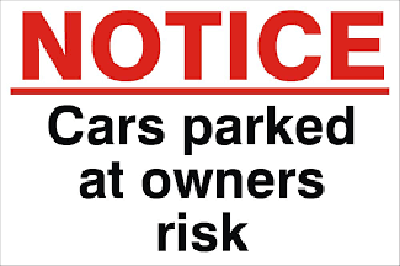What we usually see in almost everywhere we go, be it offices, hospitals, churches, mosques, cinemas, and banks, among others, is the inscription ‘cars or vehicles are parked at owners’ risk’. By this notice, owners and managers of facilities exonerate themselves from all liability in the event of a car or vehicle theft within their premises. Hence, there is a need to ask or interrogate the enforceability or otherwise of such disclaimers or notices.
The Black’s Law Dictionary describes a disclaimer as a renunciation of one’s legal right or claims. On the other hand, enforceability is the ability to execute something under the law. The issue of strict liability comes to play in this discourse to link the relationship between the motorist and owner of where such vehicle is parked.
What is strict liability? In both civil and criminal circumstances, it exists when a defendant is liable for committing an action regardless of what the intention or mental state was when committing the action. For example, the legal implication of keeping wild animals at home is that they have the potential for vicious and unpredictable behaviours that can cause significant damage to people and property. If someone keeps a wild or exotic animal and they cause harm to another person or their property, the owner is liable for the damage. Under the law of strict liability, property owners would be strictly liable for their actions. In a similar vein, a security man tasked with the responsibility of looking after vehicles parked within the jurisdiction under him tends to be culpable of a security lapse, under the principle of vicarious liability. When we talk about vicarious liability, it means that employers are liable for the torts of their employees committed during the course of employment.
It is trite in law that the principal is liable for the acts of the agent. This argument, therefore, downplays the position that facility owners, who exonerate themselves from the liability arising from the negligence of their security personnel in the event that parked vehicles are stolen within their premises. In most cases, it has been found that property owners, managers of properties and security personnel do not seem to understand the import of such disclaimers they brandish. What they simply do is to ‘copy and paste’ what they have seen in other places in what can be described as the bandwagon effect, which Investopedia refers to as the psychological phenomenon whereby people do something, or behave in a certain way, primarily because other people are doing so regardless of their own beliefs, which they may ignore or override. The truth is that nothing can be more destabilising, painful and emotionally disruptive than to hear that one’s car has been stolen simply because the ‘host’ has failed to do the needful by securing property legitimately put under their care or custody.
Why is this so? For a counsel, Ezekiel Ugwueze (Esq), “These notices at best, constitute an alarm bell, cautioning the car owner to provide extra security for his car. The proponents of this view have laboured in vain. If one is lodging in a hotel, doesn’t the hotel owe such a guest the duty of care to look after his car? Is the guest supposed to be sleeping and keeping vigil over his car simultaneously? Therefore, your sign is completely unenforceable. You can seek to disclaim liability for things like damage to property, but even those signs are subject to the reasonable test”. A reasonable test is meant to ask whether the decision made by a person is rational, legitimate and designed to remedy a certain issue under the circumstances at the time. The Court of Appeal provides more illumination on this in case of University of Ilorin Teaching Hospital v. Dr. Dele Abegunde (2013) LPELR 21375 (CA), where the reasonable man is defined as ‘a person, who acts sensibly, does things diligently, and takes proper, but not excessive precaution’.
Another attorney, Emmanuel Oti (Esq), however, agrees that such disclaimer notices cleverly exonerate managers and owners of facilities of any liability in the event of car theft for these signs are warnings and ignoring the red alerts implies that the property owner or manager would not be liable when anything goes wrong, but that if car theft in a particular place has become a recurring decimal and there are records of repeated occurrence, then the hotel management can be held responsible, as a reoccurrence is suggestive that something more than ordinary is going on, Oti argues. My humble opinion, just like that of Ugwueze, is that these disclaimers are really not enough for property owners to evade all culpability in the event of a car theft under their watch. As mentioned earlier, when talking about strict liability, the same principle also applies such that the property owner, who places the disclaimer; ‘cars or vehicles are parked at owners’ risk’, is negligent in the performance of expected duty to vehicle owners.
Negligence is any act or omission, which falls short of a standard to be expected of ‘the reasonable man’. The important ingredients that constitute negligence include the duty of care, breach of the duty, and harm or damages. The legal principle of negligence, which covers this caveat being discussed, was explained in the Supreme Court of Nigeria case of Diamond Bank Limited v. Partnership Investment Limited (2009) 18 NWLR (Pt. 1172) 67, as an omission or failure to do something, which the reasonable man, under same circumstance would do or the doing of something, which a reasonable and prudent man, would not do. Therefore, by applying the above principle to the caveat of ‘cars or vehicles are parked at owners’ risk’, it is safe to aver that once the conditions aforementioned are satisfied, the position of law is that the claimant can successfully sue for damages, under the principle of negligence, against the defendant, who are the facility managers or property owners.
Relying on the celebrated case of Justice K. O. Anyah (Appellant) v. Imo Concord Hotels Limited and ORS (Respondents), 2002, which was decided at the Supreme Court of Nigeria, where the court ruled that “There is no doubt that negligence is a specie of tort, and one man may owe a duty to another even though there is no contract between them. But a breach of contract may give rise to a proper action on negligence. In the instant cases, there is no doubt that the loss of the Appellant’s car cannot be attributed to any act of negligence on the Respondents having regard to the way they performed their duties on a fateful day and the relationship of the parties as narrated earlier in this judgment, no duty of care can be ascribed to them. If to say the Respondents left the gate unattended, and the car was driven out through the gate, there may prima facie be a duty of care to the Appellant”.
Even though judgments were delivered in both cases differently as far as negligence was concerned. Without prejudice to the judgments of the apex court, what is key is that mere display of disclaimers may not hold water, especially when all ingredients of negligence have been successfully proven against erring facility managers. As observed by Hon. Justice I. F. Ogbuagu (JSC) in the cited case of Diamond Bank Limited v. Partnership Investment Limited, ‘negligence is a fluid principle, which has to be applied to the most diverse conditions and problems of human life. Negligence is a question of fact, not law. Therefore, each case must be decided in the light of its own facts and circumstances such that the facts of a case bordering on negligence must be proved by the person, who asserts same’ in tandem with the age-long and established principle of law that ‘he who asserts must prove’.
When we find ourselves in such circumstances, should we be afraid? No. The court still remains the last arbiter. Meanwhile, it is important to clarify that this situation should not be confused with when we see the ‘no parking’ sign, which restricts parking vehicles where they can either obstruct the views of other road users or constitute a danger to them. On a final note, it is logical to say that organisations that owe the duty of care must fulfil such without precluding anyone from being security conscious. We should ensure that our vehicles are properly locked and owners of premises duly informed of vehicles parked within their premises. As it is, one can safely say that the purpose of using parking disclaimers by facility managers is meant to deter people from being careless with their belongings and avoid putting undue pressure on facility owners. So, before parking that car or vehicle, what should readily come to mind is the admonition of the Dutch Philosopher, Desiderius Erasmus, a great scholar of the Northern Renaissance that ‘prevention is better than cure’.
- Bauchi suspends 6 civil servants for stealing govt properties - November 15, 2024
- Zacch Adedeji: And the revenue keeps increasing… - November 15, 2024
- 16 states lose as S’Court dismisses suit against EFCC, ICPC, NFIU - November 15, 2024










